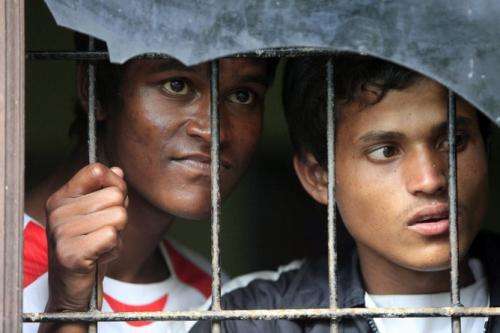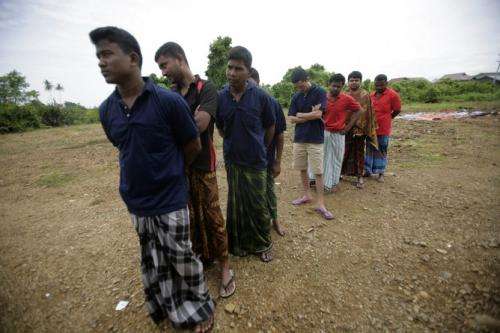Unaccompanied children seeking asylum face uncertainty and risk of exploitation

When Karim (not his real name) was a teenager, he travelled from Myanmar to Indonesia as an asylum seeker. Stranded in Java without money and friends, he slept in a mosque for a number of weeks until an Indonesian man invited him to his family home.
What first seemed like an act of kindness soon turned out to be a trap. The man molested Karim. Unaccompanied and underage asylum seekers, more than their adult counterparts, face risks of becoming victims of exploitation.
I met Karim four years after he first arrived in Indonesia. He was not a talker. But the longer we knew each other, the more he opened up.
Unaccompanied and underage asylum seekers in Indonesia
Most unaccompanied minors in Indonesia are boys aged between 13 and 17. They are usually from Afghanistan, Pakistan and Iran. Some come from Somalia and Myanmar. They travel to Indonesia en route to Australia. Asylum seekers deem the journey to Australia cheaper than trying to reach Europe or the US.
But many asylum seekers get stranded in Indonesia longer than they assumed at first. Since Australia implemented Operation Sovereign Borders in September 2013, very few boats with asylum seekers are departing from Indonesia. The Australian government intercepted some that did and turned them back to Indonesia.
They might have to wait even longer now to get resettled. In November 2014, the Australian government announced they would stop accepting refugees registered with the United Nations High Commissioner for Refugees (UNHCR) in Indonesia on or after July 1, 2014.
As of August 31, 2014, there are 9581 people registered with the UNHCR in Jakarta. 5450 of them are asylum seekers and 4,131 are refugees. 7407 were male and 2174 were female. 2652 children are currently registered with the UNHCR, including 908 unaccompanied minors and separated children. Compared to figures at the end of 2013, the number of children among the asylum seeker and refugee population in Indonesia has increased by 18%.
Indonesia has not signed the UN Refugee Convention but it has signed the Convention on the Rights of the Child. As an important transit country for asylum seekers in southeast Asia, Indonesia does have certain responsibilities in regard to offering protection for unaccompanied minors. So far, Indonesia has been highly reluctant to fulfil them. It has delegated many of its responsibilities for the care of unaccompanied minors to the UNHCR and the International Organisation for Migration (IOM).
Living in limbo

By November 2014, 950 children, including more than 440 unaccompanied minors, were housed in immigration detention centres across Indonesia. Like many adult asylum seekers, some minors "surrender" themselves to the Indonesian authorities in order to be detained. This usually happens when they have run out of resources.
Conditions for minors in detention centres in Indonesia are deplorable. Human Rights Watch released a report in 2013 detailing that children experience and witness violence in detention centres.
The IOM has been working with the Indonesian government to move the children from immigration detention centres to government-run orphanages and to provide alternative accommodation for families with children. The local partner organisation of the UNHCR in Indonesia has also established two special shelters in Jakarta for unaccompanied minors. The conditions in these shelters are far from ideal, but much better than in the immigration centres.
Around 120 children stay in the two shelters. They receive basic medical care and enjoy some educational activities (IT and language courses, swimming, futsal). None, however, attend school on a regular basis.
They receive a small allowance ($15) a week to cover their costs, such as food. The shelters apply very strict rules, such as night curfews. Failure to comply leads to expulsion. In order to be accepted into these shelters, some asylum seekers pretend to be under 18.
The special shelters have limited capacity to meet a growing demand. Newly arrived asylum seekers have to depend on friends or new acquaintances for accommodation. Young men often rent cheap rooms in Jakarta. Latest observations revealed that more and more asylum seeker children are forced to sleep on the street or in mosques.
Asylum seekers and refugees in Indonesia have no legal rights to work and earn money. Monthly stipends from the UNHCR are only available for a small number of vulnerable cases. Asylum seekers under the care of the IOM receive higher monthly stipends. But in Indonesia, asylum seekers and refugees often face extortion, which makes it hard to make ends meet.
At the beginning of their journey, most asylum seekers would have money or be able to rely on remittances from back home or friends elsewhere. Usually these funds dry out the longer they are stuck in transit. Some asylum seekers have tried to enter the informal employment sector, such as working as motorbike taxi drivers, but the local population oppose such attempts. Next to surrendering to immigration detention, some asylum seekers (including minors) give in to sex work and other forms of exploitation.
Unaccompanied minors in Indonesia can undergo the bureaucratic process to get refugee status and apply for international protection. However, they have no access to legal aid. Without a legal guardian, they face even more obstacles dealing with international protection regime. Even adults find the process of providing detailed evidence to prove they need protection difficult.
The long waiting times in Indonesia cause substantial stress among both minor and adult asylum seekers. Not knowing what the future will hold for them and where they will end up going, some try to numb their sorrows through substance abuse.
Infantilisation of migration
Children have always made up a significant proportion of the international refugee population. But recently, scholars have started talking about the "infantilisation of migration". More and more children are compelled to leave their homelands – with or without their families – in search of asylum.
While most children travel with their parents, some have been separated from their kin or became orphaned before or during the journey.
In some cases, parents send their underage children ahead as "lead migrants" as they lack the money required to flee with the entire family. They hope the child could be the key figure for a potential family reunion outside of their country of origin. Families are mostly motivated by the hope to escape wars and conflict in their home or transit countries. Potential education and employment in the host country might also serve as incentive. Children's search for asylum is often facilitated by exploitative and abusive arrangements, during and sometimes after the journey.
Another reason for why children travel on their own is to make use of the few remaining gaps in the restrictive asylum policies of the west. Many potential destination countries have special protection for people under 18. It is usually harder (but not impossible) for transit or destination countries to deport minors.
That said, after going through the arduous journey, minors have slim chances to be resettled even when found to be genuine refugees. Many countries, including Australia, refuse to accept underage refugees in order to avoid claims for family reunion.
Source: The Conversation
















